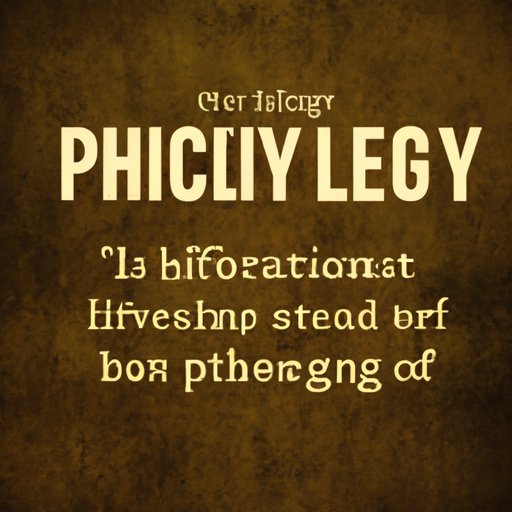Introduction
At some point, we have all lied. Whether it’s a little white lie or a big deception, lying is a common and often tempting behavior. However, being dishonest can come with significant negative consequences, both for ourselves and those around us. In this article, we will explore why people lie, the effects of lying on personal and professional relationships, the psychology behind deception, and how to break the habit of lying. We will also delve into the ethics of lying and explore when and why it may be appropriate to deceive others. By the end of this piece, readers will have a better understanding of the importance of honesty and the steps they can take to live more truthful lives.
The Consequences of Lying: Why Honesty is Always the Best Policy
One of the most significant reasons to avoid lying is the potential negative effects on our relationships. When we lie to others, we risk damaging their trust in us. In personal relationships, this can lead to breakups, friendship dissolutions, and strained family connections. In professional settings, lying can lead to decreased productivity, decreased morale, and even loss of employment.
The reality is that telling lies can lead to getting caught in them. When this happens, there are often serious consequences, including legal repercussions, social embarrassment, and damage to our reputation. Additionally, repeatedly getting caught in lies can make it harder for others to trust us in the future, further damaging our relationships with those around us.
On the other hand, honesty has numerous benefits. When we are open and truthful with those around us, we build trust and credibility, leading to stronger connections and improved relationships. In professional settings, we are more likely to be taken seriously and given added responsibilities when we are viewed as trustworthy. Overall, honesty is the best policy, and it’s essential to understand how lying can negatively impact our lives.

The Psychology of Lying: What Drives Us to Deceive Others
Lying is a complex behavior that stems from various motivations. Often, we lie to avoid getting into trouble or to protect ourselves. However, other times we may deceive others to promote ourselves or to gain advantage. Whatever the motivation, lying can have long-term impacts on our physical and emotional wellbeing.
Research has shown that different types of lies affect the brain differently. When we tell a lie, we activate the amygdala, the part of the brain associated with emotional processing. This part of the brain is also responsible for regulating our stress levels, suggesting that lying can lead to increased anxiety. Over time, lying can become a habit, and we may become desensitized to these effects.
Common types of lies include outright lies, omissions, and exaggerations. These lies can manifest in various situations, including personal interactions, business transactions, and political settings. While we may feel like lying is the easiest option, it can lead to negative outcomes, including loss of trust, damaged relationships, and decreased self-esteem.
The Root of the Problem: Addressing the Reasons Behind Our Tendency to Lie
To stop lying, we need to identify why we are lying. Often, lying is a behavior rooted in personal insecurities, low self-esteem, or a lack of communication skills. To address these issues, it’s important to start with self-reflection. Taking the time to identify our triggers for lying and the personal reasons behind the behavior can help us develop better communication skills and improve our overall well-being.
One common reason for lying is fear of negative judgment. If we are anxious about how others will perceive us, we may be more likely to deceive them. Improving communication skills and learning to express ourselves honestly and tactfully can help us build confidence in interpersonal interactions.
In some cases, we may need to address larger personal insecurities, such as low self-esteem, before we are comfortable enough with our own sense of self to be honest with others. This may involve working with a therapist or engaging in self-improvement practices, such as meditation or positive affirmations.
Breaking the Habit: Simple Steps to Stop Yourself from Lying
Stopping a habit of lying is a process that requires time and effort. To succeed, we need to start with self-awareness. Taking note of when and why we are lying can help us identify our triggers and work to break those habits.
Building self-confidence is also an essential step. When we feel secure in ourselves and our ability to communicate, we are less likely to feel the need to deceive others. This can involve practicing positive self-talk, engaging in physical exercise, and developing a strong support network.
Finally, it’s important to realize that we don’t always need to be brutally honest, particularly in certain situations. Learning to speak the truth tactfully and respectfully can help us achieve better results with others without sacrificing our personal integrity.
The Ripple Effect: How Our Lies Affect Those Around Us
The impact of our lies goes beyond just ourselves. Every time we are dishonest with others, we risk harming the trust and relationships we have with them. This can have far-reaching implications, both on a small and large scale.
In personal relationships, lying can lead to deep emotional wounds. Trust is essential in any healthy relationship, and when that trust is broken, it can be challenging to rebuild. Additionally, lying in personal relationships can harm our self-esteem, making it harder to connect with others in the future.
In professional settings, lying can lead to lost opportunities for advancement and decreased productivity due to damaged trust. Additionally, lying in business transactions can lead to legal repercussions and decreased customer perception.
On a larger societal scale, we can observe the impact of lies in political settings. Misinformation can lead to incorrect policy decisions, decreased public trust, and decreased social cohesion.
The Ethics of Lying: When is it Appropriate to Deceive Others?
While honesty is generally the best policy, there are situations where lying may be appropriate. For example, in certain social interactions, it may be more appropriate to tell a small white lie than to be completely truthful. Similarly, in situations where revealing the truth may cause harm, such as in medical emergencies, deception may be necessary.
However, it’s essential to reflect on our personal beliefs and values when considering when it is appropriate to deceive others. We must consider the potential consequences of our lies and decide whether they outweigh the benefits of temporary delay or avoidance of a negative outcome.
Living with Integrity: Why Being Honest with Yourself is Key to Living a Fulfilling Life
At the end of the day, the most important aspect of honesty is how it affects us personally. Living with personal integrity means being honest with ourselves about our values, beliefs, and motivations. This can help us build a sense of self-respect and self-esteem, leading to healthier relationships and a more fulfilling life.
Living honestly also means embracing vulnerability. There will be times when being honest may be uncomfortable, but understanding that vulnerability is a necessary part of personal growth can help us develop a more authentic existence.
Conclusion
Lying is a common behavior that can have significant negative consequences. Understanding the psychology behind lying, addressing personal insecurities that may lead to refusing the truth, and recognizing how our lies affect those around us can help us take steps to become more honest in our daily lives. By approaching honesty with a sense of personal value and integrity, we can build stronger relationships with those around us, achieve greater success in our professional lives, and live healthier and more fulfilling existences.
